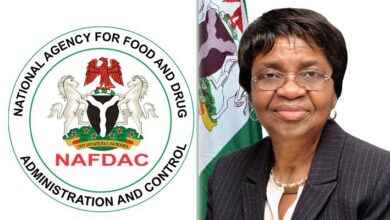The Director General of the National Agency for Food and Drug Administration and Control (NAFDAC), Mojisola Adeyeye, has praised President Bola Tinubu for signing an Executive Order aimed at boosting local production of health products, reducing costs of health equipment, and encouraging investments in the sector.
Mrs. Adeyeye described this Executive Order as a significant step towards achieving the administration’s goal of revitalizing the health sector. The EO sets the stage for sustainable and quality healthcare improvements.
In a statement issued on Saturday, Mrs. Adeyeye emphasized that the signing of the EO underscores the president’s commitment to transforming Nigeria’s health sector.
“This initiative, part of the Nigeria Health Sector Renewal Investment Initiative (NHSRII), addresses longstanding challenges and aims to improve health outcomes for Nigerians. It aligns with the broader objectives of the NHSRII and the Presidential Initiative on Healthcare Value Chain (PVAC),” she said. “By addressing core challenges and providing a clear path for improvement, this EO sets the stage for a sustainable and high-quality healthcare system for all Nigerians.”
New Order
According to PREMIUM TIMES, President Tinubu signed the executive order to boost local production of health-related materials as part of the national effort to revitalize the health sector. Enhancing local production will improve access to health materials and reduce the costs for healthcare seekers and providers across the country. This move is expected to lower the cost of medications, which has been rising due to the country’s heavy reliance on imports.
The new order introduces zero tariffs, excise duties, and VAT on specified machinery, equipment, and raw materials to enable local manufacturers to compete with multinationals. It exempts specified pharmaceutical machinery, equipment such as needles and syringes, biologicals, and medical textiles from tariffs and excise duties to reduce production costs and make healthcare products more affordable.
Announcing the EO, the Coordinating Minister of Health and Social Welfare, Muhammad Pate, stated that the order is crucial for unlocking the healthcare value chain. It provides mechanisms such as framework contracts and volume guarantees to encourage local manufacturers.
NAFDAC’s Efforts
In the past six years, NAFDAC has implemented policies to boost local production and support local manufacturers, according to Mrs. Adeyeye. These efforts are beginning to yield positive results.
In 2019, NAFDAC issued the Five-Plus-Five RD directive to maximize local manufacturing capacity by limiting import renewals of medicines that can be locally produced. Two years later, the agency introduced the Ceiling 34 Regulatory Directive to limit the importation of medicinal products, promoting local production. As a result, there was a 30% increase in new manufacturing facilities.
Despite these efforts, local manufacturers faced challenges due to the high costs of importing all manufacturing materials except water. Mrs. Adeyeye advocated for zero tariffs to provide local manufacturers with the necessary space to thrive. This advocacy has now materialized with the new executive order.
Implementation
The executive order aims to boost local manufacturing, create jobs, stimulate economic growth, and ensure a reliable supply of essential healthcare products. With the president’s approval, the Attorney General of the Federation, Lateef Fagbemi, will take steps to codify the new order.
Implementation of the order will be carried out by NAFDAC, alongside the Nigeria Customs Service, SON, and FIRS, with special waivers and exemptions effective for two years. The order mandates the Ministers of Health, Finance, and Industry, Trade and Investment to develop a harmonized implementation framework to expedite regulatory approvals and reduce bottlenecks.




